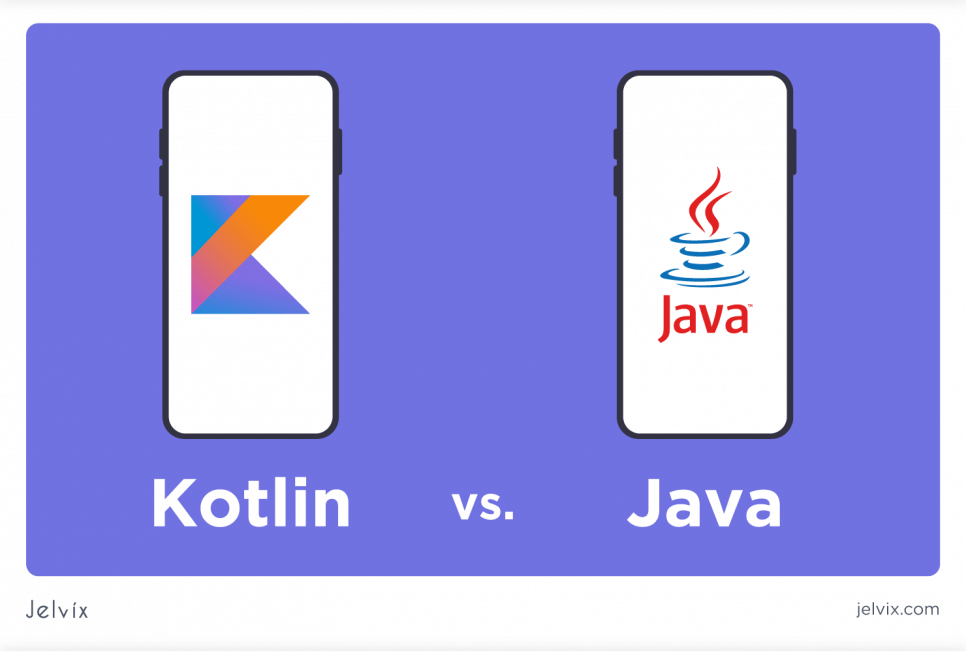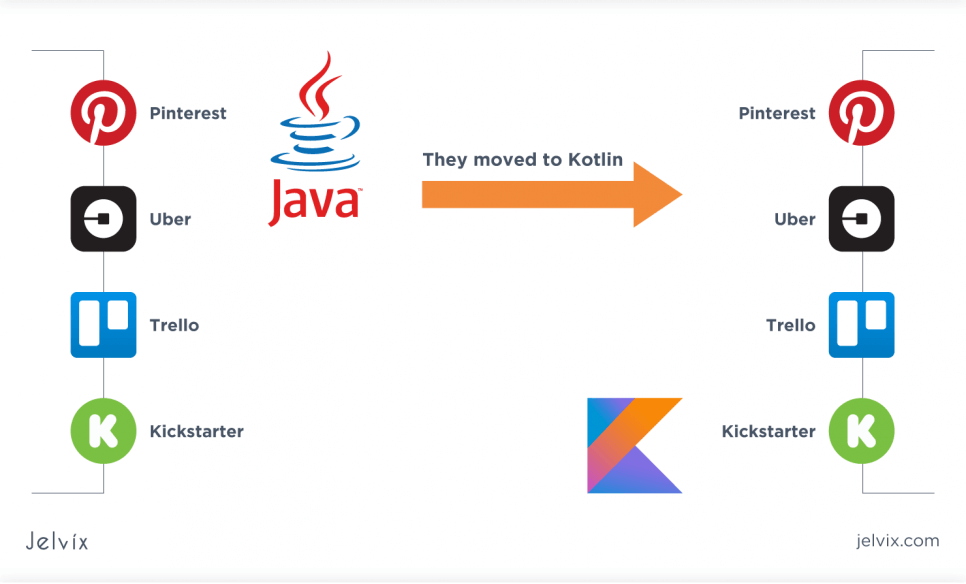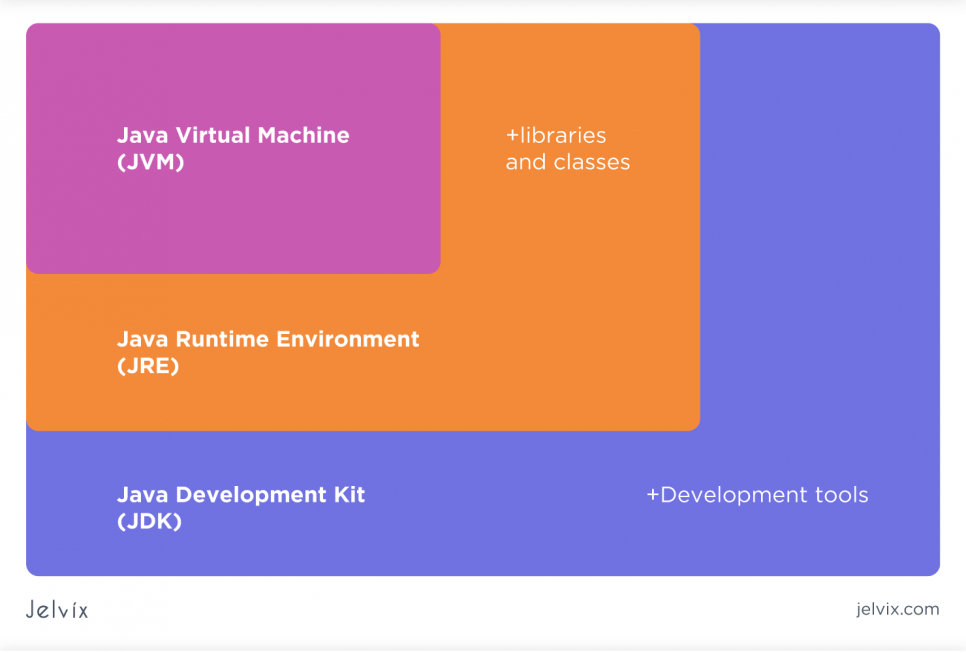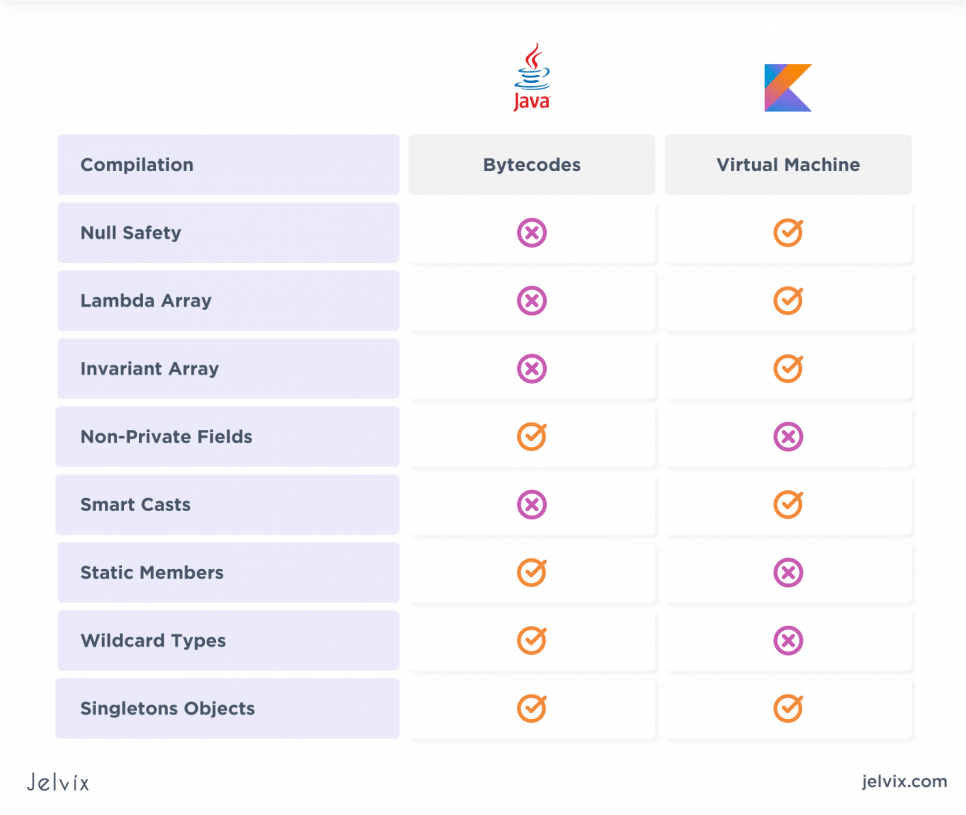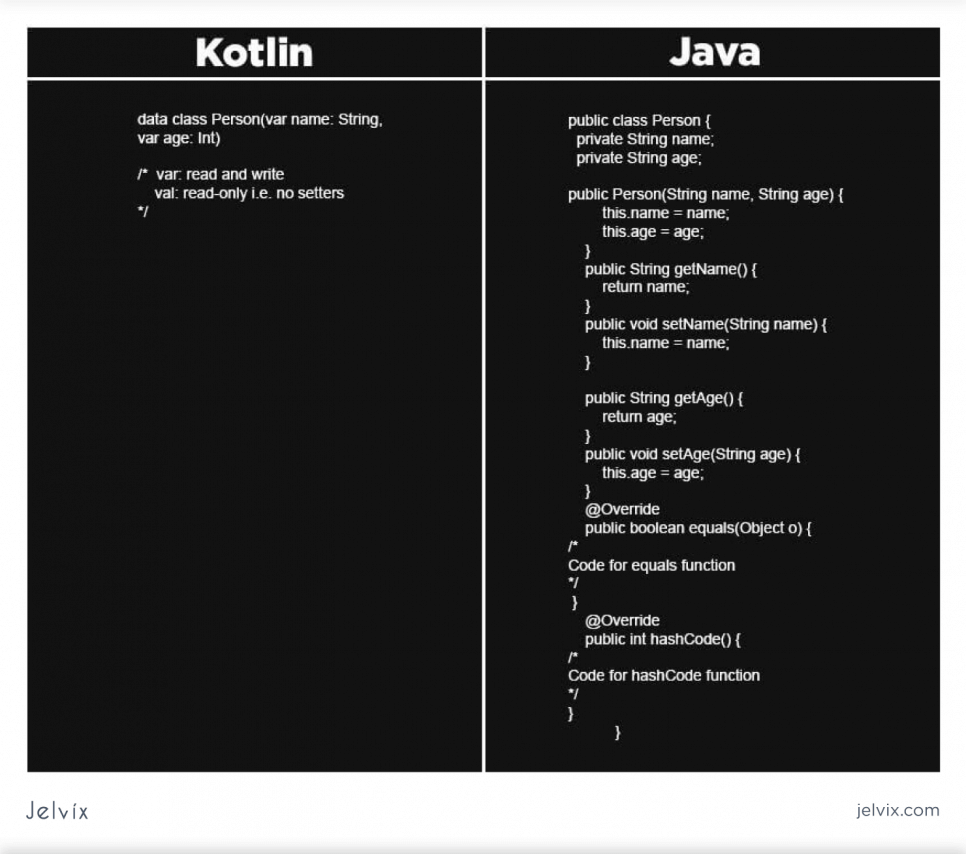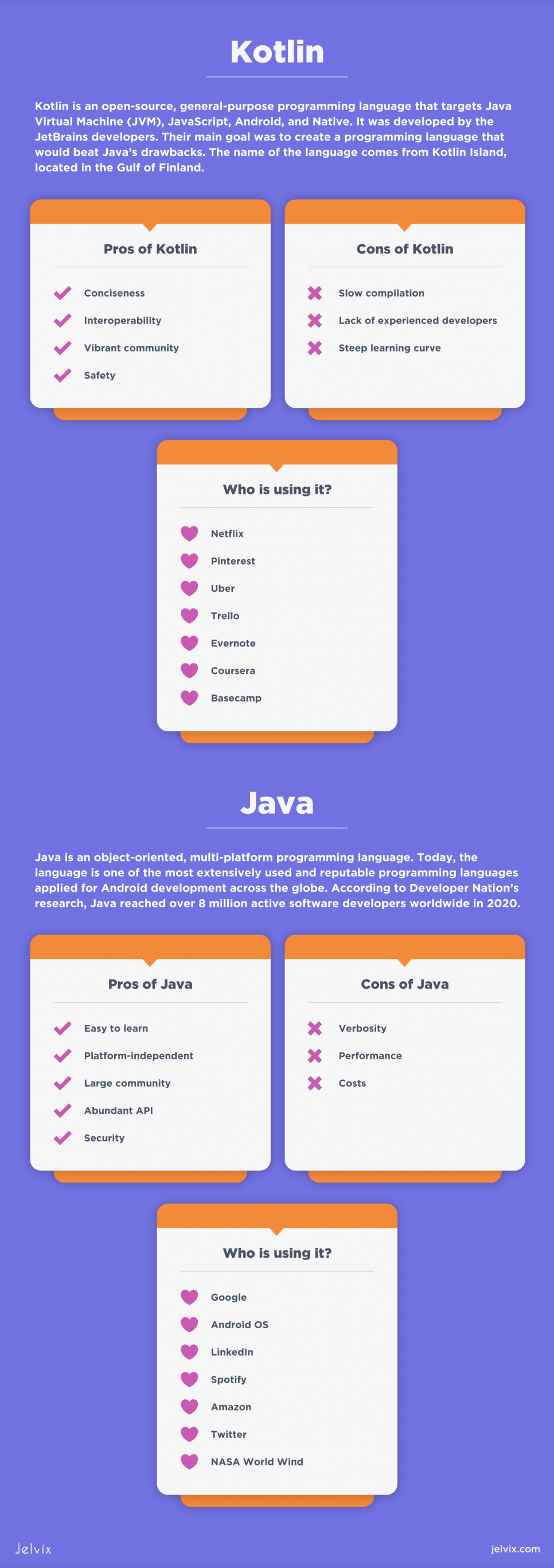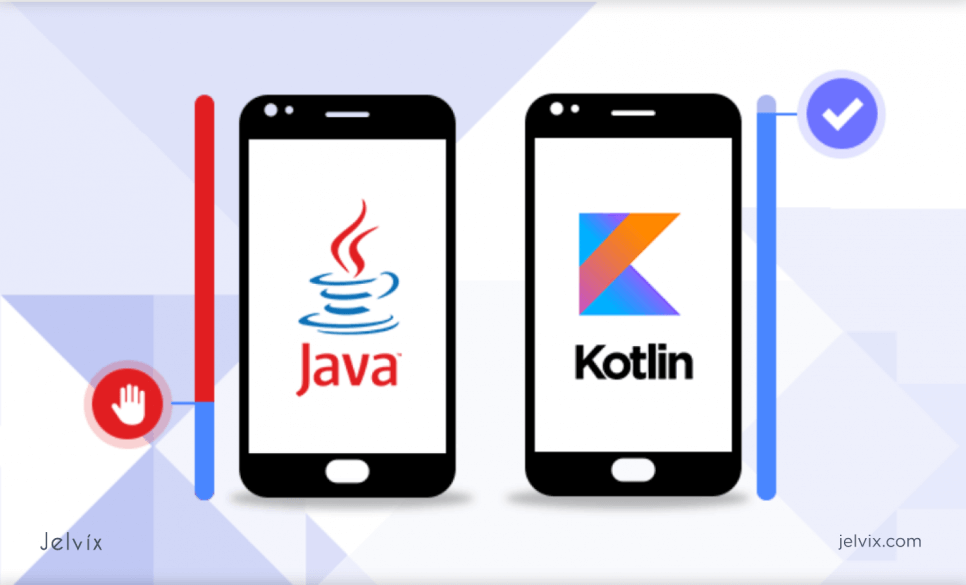When it comes to Android application development, Java will probably be the first programming language to spring to your mind. And it is hardly surprising since the language has been around for 26 years already. However, Java is not the only language that can be used for building software for Android.
Nowadays, there is a whole host of new programming languages that are popping out like mushrooms after the rain. They are designed with the main aim to call into question the supremacy of Java in the Android sector.
One of them is Kotlin, a comparatively young programming language that has been proclaimed as Google’s preferred language for the development of Android apps. Although Kotlin is still being constantly improved, it has already obtained the reputation of a reliable, mature, general-purpose programming language with a rapidly increasing community.
This article is going to take a closer look at the distinguishing characteristics of the two programming languages, explore their benefits and drawbacks, and, of course, discuss the difference between Java and Kotlin.
What is Kotlin?
To start with the basics, Kotlin is an open-source, general-purpose programming language that targets Java Virtual Machine (JVM), JavaScript, Android, and Native. It was developed by the JetBrains developers. Their main goal was to create a programming language that would beat Java’s drawbacks. The name of the language comes from Kotlin Island, located in the Gulf of Finland.
The language is inspired by a range of existing programming languages such as Java, JavaScript, Scala, C#, and Groovy. Thanks to that fact, it can be quickly learned by Java Developers.
The first official release of Kotlin was in February 2016. In 2017, Google announced at their I/O conference that since then, they started to support Kotlin for Android development officially; from that point forward, the popularity of the language was to start growing exponentially.
Nowadays, Kotlin is a concise, safe, pragmatic programming language that can be used almost everywhere where Java is used. Moreover, it is seamlessly compatible with all existing Java frameworks.
The language is supported by all the leading Integrated Development Environments (IDEs), including Eclipse, NetBeans, Android Studio, and IntelliJ IDEA.
Pros of Kotlin
The Kotlin language offers numerous advantages to developers. Some of its key benefits include:
- Conciseness
When comparing Java to Kotlin, the latter has proven to be more laconic and expressive. Kotlin allows developers to solve the same problem by writing less code. As a result, it improves code readability, leaves less space for errors, and makes the code more efficient.
- Interoperability
Kotlin can boast full interoperability with Java. It is 100% compatible with the ecosystem of Java frameworks, tools, and libraries. In addition, one, and can be integrated with Gradle and Maven build systems.
Programmers can write new modules in Kotlin without doubting whether they will work with the existing Java code. All of that makes Kotlin an easy-to-learn-and-use language for Android developers that were previously using Java to build their apps.
- Vibrant community
Even though Kotlin is a quite young programming language, it has a strong and supportive community of programmers that stand behind it. All interested developers can benefit from the constantly growing number of open-source projects published on GitHub. One can find a range of learning resources, courses, blogs, videos, and tutorials to learn the language.
- Safety
The Kotlin language eliminates a significant number of coding errors that may become the reasons for system crashes and failures. Thanks to its simplified framework, it requires developers to write fewer lines of code, which eventually means fewer coding errors. Except that, the language performs a range of different checks that allow detecting bugs early at the compile time.
Cons of Kotlin
Unfortunately, there’s nothing perfect in this world, and Kotlin is no exception. It has its fair share of drawbacks, which include:
- Slow compilation
One of the main drawbacks of Kotlin is slower code compilation, especially when comparing it to Java. The numbers show that Java is 17% faster than Kotlin for compiling clean builds.
- Lack of experienced developers
For example, when comparing Kotlin vs Python or Kotlin vs JavaScript, the latter two will have more proficient engineers available on the job market. Since Kotlin is only beginning to gain popularity, finding an experienced developer to lead the team may be a daunting task.
- Steep learning curve
The Kotlin language has a steep learning curve. Albeit the language has an extremely concise syntax, which is one of its primary advantages, it will still take your team some time to learn it upfront.
What is Kotlin used for?
Being a general-purpose programming language, Kotlin can be employed for server-side, client-side web, and Android development. Yet, for the most part, it is applied as a Java alternative to develop applications for Android. According to recent statistics, over 60% of Android developers use Kotlin to build safer and more robust software.
A wide array of large companies with household names switched to Kotlin thanks to its lightweight, concise and clean nature. Among the businesses that chose to develop apps in Kotlin are:
- Netflix;
- Pinterest;
- Uber;
- Trello;
- Evernote;
- Coursera;
- Basecamp.
What is Java?
Java is an object-oriented, multi-platform programming language. Today, the language is one of the most extensively used and reputable programming languages applied for Android development across the globe. According to Developer Nation’s research, Java reached over 8 million active software developers worldwide in 2020.
At first, the language got the name “OAK.” The Java language was created for Sun Microsystems’ set-top box project in 1991. Later, in 1995, the language was renamed “Java” (after an island in Indonesia famous for producing dark, strong coffee that’s also called Java bean). In 2009, Oracle Corporation acquired Sun Microsystems and became the owner of the main Sun’s software products: Java, Solaris, and MySQL.
Java is a general-purpose and platform-independent language. It was created with the WORA (Write Once, Run Anywhere) principle as its basis. It means that once the Java code is compiled, it will work on almost any device, operating system, server, or platform that supports Java without the need to be recompiled.
Furthermore, Java can be characterized as a scalable, secure, and robust programming language that can be applied to build a whole host of various desktop, enterprise, cloud-based, and web-based applications. Its architecture incorporates three main components:
- Java Virtual Machine (JVM). It is an engine that provides a runtime environment for the execution of Java code. Its primary purpose lies in converting the Java bytecode which, in fact, is a language that can be understood by the device.
- Java Runtime Environment (JRE). It is a part of the Java Development Kit (JDK) that encompasses all class libraries and JVM essential for executing the Java applets and applications.
- Java Development Kit (JDK). Together with JVM and JRE, it represents the software development environment that provides tools to build java applications.
Pros of Java
Java offers a wide range of benefits to developers that are utilizing it. Among the principal advantages of the programming language are the following factors:
- Easy to learn
When compared to many other popular programming languages, Java is easy to learn and understand. It is a well-structured and object-oriented programming language with an understandable syntax, which makes it fairly easy for beginners.
- Platform-independent
Platform independence is probably the primary benefit of Java. The compiler allows software engineers to convert Java source code to bytecode which is an intermediate language. It means that this bytecode can then be executed on any platform by using the JVM.
- Large community
As Java is among the top 10 most popular programming languages, it is obvious that it has a large community of users behind it. That being said, it is easier to find help in case support is needed or to learn the language as there are a lot of resources available online.
- Abundant API
Java provides a rich Application Programming Interface (API) that can be used by software developers to build integrations between different applications and make them communicate with each other.
- Security
Java has a range of built-in security features, including garbage collection, automatic memory management, and range-checking on the array. All of that results in the reduction of programming errors and makes the code more secure and robust.
Cons of Java
Yet, like any other programming language, Java has a certain number of limitations. Some Java disadvantages are listed below:
- Verbosity
If comparing Kotlin vs Python vs Java, the latter is wordier in terms of code. Since it requires more lines of code to perform the same tasks, it is more prone to bugs and subtle programming errors.
- Performance
Java is considerably slower than other languages (e.g., C or C++) because of the necessity to be interpreted during the runtime. Aside from that, the applications written in this language consume a considerable percentage of the system’s resources (CPU and memory).
- Costs
Since Java applications need more resources and have high processing requirements, you’ll need better hardware to develop Java programs, which may be rather expensive.
Let’s take a deeper look at the difference between Java vs .Net, their respective advantages and disadvantages.
What is Java used for?
Being one of the most broadly used programming languages, Java can be used for a vast array of purposes, including mobile app development, building commercial websites, games, big data technologies, cloud-based and web-based applications, desktop and enterprise solutions, etc.
Among the top companies that are using Java are the following:
- Google;
- Android OS;
- LinkedIn;
- Spotify;
- Amazon;
- Twitter;
- NASA World Wind.
Java vs Kotlin: the major differences explained
Since now you have some background knowledge on what both languages are capable of, let’s take a closer look at the points that differentiate them.
Null Safety
In Java, NullPointerExceptions are the major nightmare for software developers. The language allows users to attribute a null value to any variable, leading to development errors.
In contrast, the Kotlin language has built-in null safety, which means that users are not able to assign null values to any variable. Nevertheless, if developers want to assign a null value, they will have to mark the desired variable as nullable explicitly – e.g., value num: Int? = null.
Data Classes
As a rule, Java developers are required to define constructors, getter and setter methods, hashCode(), equals(), toString() functions, and variables to store the data.
Kotlin, on the contrary, makes the creation of classes a lot easier. The software engineer can achieve it by simply adding the “data” keyword in the class definition, and after that, the compiler will do all the rest automatically.
Extension Functions
Another Kotlin’s advantage over Java is the ability to extend the functionality of classes. The developers can create extended functions just by prefixing the name of the class that is extended to the name of the new function.
At the same time, if engineers want to extend the functionality of the existing class in Java, they will have to establish a new class and acquire the parent class.
Smart Casts
In Java, the engineers are required to check the type of variable in accordance with the operation to cast an object. Kotlin, on the contrary, provides a smart cast feature that handles the casting checks.
Functional Programming
If we compare Java to Kotlin, Java doesn’t support functional programming. In fact, it was limited to object-oriented programming till Java 8. Kotlin, in its turn, is a perfect combo of functional and procedural programming which incorporates a range of useful methods, including operator overloading, lambda, higher-order functions, etc.
Type Inference
Java makes it mandatory for engineers to specify the type of each variable explicitly. In Kotlin, it’s quite the opposite – developers are not required to specify the type of every variable explicitly. Yet, they can do it if they want to.
Coroutines Support
Java allows creating multiple background threads to handle long-running operations, especially when it comes to the network I/O or CPU-intensive operations. Yet, managing multiple threads is pretty complicated, and quite often, it leads to more coding errors.
Similar to Java, Kotlin also offers developers the ability to create multiple threads. However, it can also boast a more efficient way to solve this issue – coroutines. The coroutines allow software engineers to suspend the execution of the thread at some point without blocking other threads.
Checked Exceptions
Java provides support for checked exceptions. What it means is that developers are obliged to catch and declare exceptions. Although a lot of software engineers hate this requirement as it’s time-consuming, checked exceptions ensure good error handling and more robust code. Kotlin, on the other hand, doesn’t have checked exceptions.
Primitive Types
There are 8 different data types in Java, including int, boolean, short, double, long, float, char, and byte. Yet, these variables cannot be objects instantiated from a struct or a class in Java. However, when developers initiate a variable of primitive type in Kotlin, it is considered an object.
Wildcard Types
As a rule, the question mark (“?”) in code represents a wildcard that stands for an unknown type (type of parameter, variable, or field). Unlike Java, Kotlin has no wildcards. As a substitute, Kotlin developers can use declaration-site variance and type projections.
Implicit Widening Conversions
The Kotlin language does not provide support for implicit widening conversions. It means that smaller types cannot get converted to bigger types. As an alternative, to achieve the desired type of conversion in Kotlin, one has to perform an explicit one. Contrary to this, Java supports implicit conversions.
Code Conciseness
If we compare Kotlin to Java in terms of length of classes, the conciseness of the Kotlin code becomes evident at the very first glance. Kotlin requires fewer lines of code than Java to perform the same operations necessary.
The brevity makes Kotlin code easily manageable and less error-prone, which means that it significantly simplifies the work of developers by decreasing the amount of time spent on locating bugs and fixing them.
Kotlin or Java: Which is the best choice?
So, which one to choose – Kotlin or Java? In fact, both programming languages have their own strong and weak points.
If considering all the drawbacks of Java, especially the issues with NullPointerExceptions, Kotlin seems to be the definite winner in this battle. The other benefits of the Kotlin language for Android development are innumerable because, as we have mentioned before, it requires less code, can be compiled faster and offers coroutines and higher-order functions support.
The recent Google’s claim that Kotlin is the preferred language for Android development serves as absolute proof that the language has undeniably a bright future and perspectives ahead. With the increasing number of companies switching to Kotlin as the primary language for their business app development, the language is predicted only to increase its dominance in the years to come.
Nonetheless, Java is still one of the leading programming languages in Android app development, so the chances that it’ll be entirely replaced by Kotlin soon are pretty low.
Final thoughts
Kotlin and Java have their advantages and disadvantages. The dispute over which language is better, simpler, or more efficient has just begun, and it is not going to be resolved in the near future.
The process of choosing the right programming language for your application development is quite complicated and demands considering a lot of different factors. If, after reading this article, you still have questions like “What can I do with Java or Kotlin?” or you have an app idea and lack a team of proficient developers, Jelvix is here for you.
Don’t hesitate to get in touch with us. Our team of experts will be happy to answer any of your questions regarding Java or Kotlin and guide you in the right direction.
Need a qualified team of developers?
Scale your development capacity with top-level expertise and resources.


